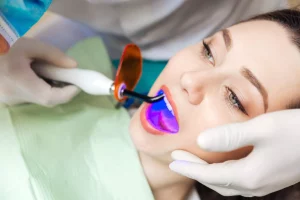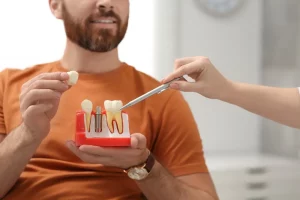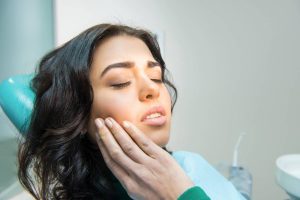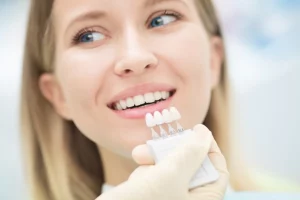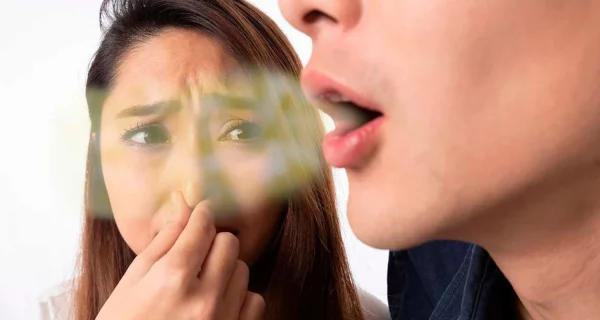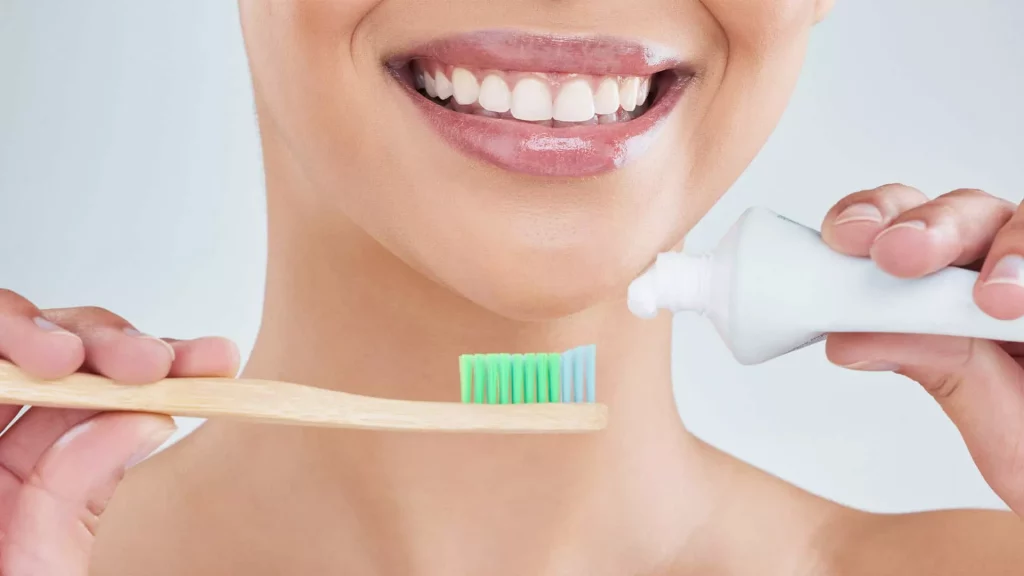Last Updated on: 19th December 2025, 06:05 am
The best oral hygiene practices for women include brushing and flossing daily, staying hydrated, avoiding tobacco, and visiting the dentist often. Because women’s hormones fluctuate throughout life, it’s essential to adjust their dental care at every stage to maintain a strong and healthy smile.
Have you ever noticed that your dentist keeps reminding you to brush and floss every day? It might sound simple, but oral hygiene is one of the strongest tools for staying healthy.
For women, it’s even more meaningful. A clean and healthy mouth doesn’t just give you confidence when you smile; it helps prevent infections, supports the heart, and improves overall well-being.
When you take care of your mouth, you’re taking care of your whole self.
Table of Contents
ToggleHow do hormones affect women’s oral health?
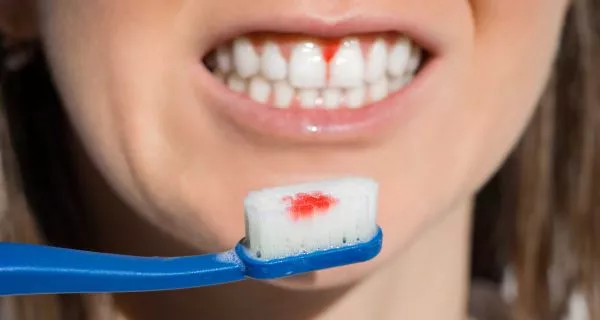
Women’s hormones influence almost everything: mood, skin, energy, and yes, even the gums and teeth.
Estrogen and progesterone can change blood flow to your gums and how your body reacts to bacteria. That’s why, at certain times, your gums might feel swollen, tender, or bleed more easily.
Learning how these changes work helps you protect your smile through each chapter of life.
What happens during puberty?
When puberty begins, hormones rise quickly; that can make your gums more sensitive. You might notice:
- slight swelling
- bleeding when brushing
- gum irritation
But don’t worry, this is normal. The best thing you can do is create strong habits early, like brushing twice a day, flossing daily, and visiting the dentist at least once a year.
A healthy routine now means fewer problems later.
Why is oral care so important during pregnancy?
Pregnancy is one of the most beautiful and delicate times in a woman’s life, but the same hormones that help your baby grow can also make your gums more reactive and prone to inflammation.
Some women experience what’s called pregnancy gingivitis, which causes gums to bleed or feel swollen.
It’s important to include the mouth in your pregnancy care plan and not wait until after the baby arrives.
Tips for a healthy smile during pregnancy
- Brush gently with a soft toothbrush and fluoride toothpaste.
- Floss carefully, even if your gums bleed a little.
- If you have morning sickness, rinse your mouth with water or a mild mouthwash, and wait 30 minutes before brushing.
- Schedule a dental checkup every trimester.
At Channel Islands Family Dental Office, we take care of moms and babies with safe, comfortable, and compassionate treatments designed for every stage of pregnancy.
What about oral health during menopause?
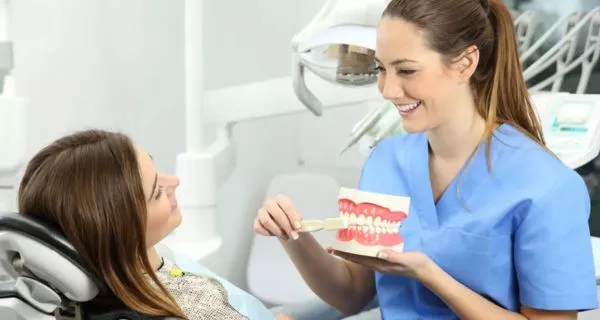
Menopause brings another big hormonal change. With lower estrogen, some women feel dryness in their mouths, notice gum recession, or feel more sensitivity.
These symptoms can be uncomfortable, but there are ways to help.
How to protect your smile at this stage
- Sip water often to stay hydrated.
- Use alcohol-free mouthwash to avoid more dryness.
- Avoid smoking and limit alcohol.
- Visit your dentist for regular cleanings and care.
Remember, aging doesn’t mean losing your teeth or having problems with your smile. With the right habits and guidance, your teeth can stay strong and bright for life.
What daily habits help keep a healthy smile?

A beautiful, healthy smile is built through small daily habits. It doesn’t take complicated routines, just consistency and care.
How to clean teeth correctly?
- Brushing: two times a day, using a soft brush and fluoride toothpaste.
- Flossing: once a day, to clean where your brush can’t reach.
- Tongue cleaning: helps reduce bacteria and keeps your breath fresh.
- Mouthwash (optional): for an extra layer of freshness and protection.
Remember to replace your toothbrush every three months or sooner if the bristles become frayed.
How does food affect your oral health?
What you eat matters for your mouth. Some foods protect your teeth, while others damage them over time.
Eat more:
- Fresh fruits and vegetables: they naturally clean the mouth and add vitamins that strengthen gums.
- Dairy products like yogurt or cheese: they’re rich in calcium and protect the enamel.
- Foods with vitamin D and phosphorus, like eggs, fish, or nuts, help the body absorb calcium.
Eat less:
- Sugary drinks, candies, and ultra-processed snacks: they feed bacteria and increase the risk of cavities.
When your diet is balanced, your teeth stay stronger, your breath fresher, and your smile brighter.
Why is hydration so important?

Water keeps everything in balance. It washes away food, helps saliva do its job, and protects the mouth from bacteria.
Benefits of drinking water
- prevents dry mouth
- reduces plaque and bad breath
- keeps your gums healthy
If you’re taking medication or going through menopause, drink water frequently to keep your mouth moist and healthy.
Why should you visit the dentist regularly?
Even if you have perfect hygiene, dental visits are essential since they help detect small problems before they become painful or expensive.
Your dentist can find:
- hidden cavities
- gum disease
- early signs of oral cancer
At Channel Islands Family Dental Office, we offer gentle checkups made specially for women, focused on prevention, comfort, and long-term health.
What habits should you avoid for better oral health?
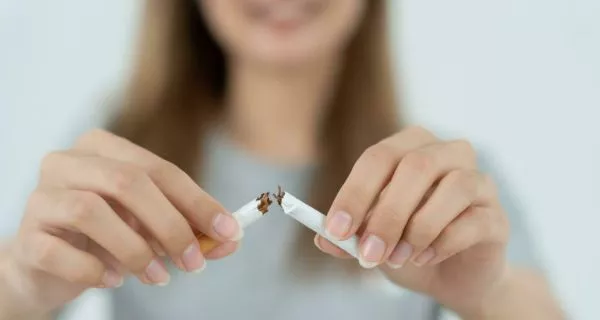
Some habits can silently harm your smile, even if you brush and floss every day. They may seem small, but over time, they can undo all your good efforts and affect not only your teeth but also your confidence.
Try to avoid:
- Smoking or vaping: They dry your mouth, stain your teeth, and weaken your gums.
- Drinking too much alcohol: It reduces saliva and erodes your enamel.
- Snacking all day: Constant sugar feeds bacteria that cause cavities and bad breath.
- Grinding or clenching your teeth: This wears them down and creates jaw tension or pain.
- Using your teeth to open bottles or packages: One wrong move can easily crack them.
These habits can affect anyone, but women’s mouths are often more sensitive to hormonal and lifestyle changes. By choosing gentle care and mindful routines, you protect your smile and confidence. That’s what true oral hygiene practices for women are all about: self-care that begins with your smile.
Why is education about oral health important for women?
Learning about oral hygiene is more than just knowing how to brush; it’s about empowerment. When women understand how hormones, nutrition, and daily habits affect their mouths, they can make smarter choices for their health.
Education helps:
- boost confidence: because a healthy smile makes you feel better about yourself.
- prevent diseases like gingivitis or enamel loss.
- pass good habits to your children and loved ones.
Understanding your body and mouth is the first step to true health and confidence.
How is oral health connected to your overall well-being?
The mouth is connected to the body and your emotions. Poor oral health can increase the risk of:
- heart disease
- diabetes
- pregnancy complications
A healthy mouth, on the other hand, helps you feel and look better, and live with more energy. Smiling freely and eating comfortably brings confidence, and confidence is beautiful.
How can women keep a healthy smile for life?
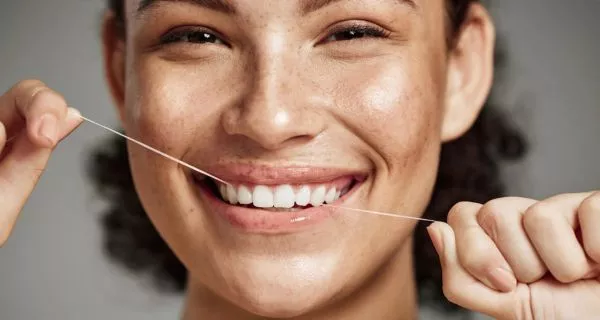
Taking care of your mouth is a form of self-love. Your smile grows and changes with you, and every stage deserves its own care.
Keep these habits in mind:
- Brush with fluoride toothpaste.
- Floss and clean your tongue daily.
- Stay hydrated and eat healthy.
- Visit the dentist regularly.
Good oral hygiene practices for women mean more than clean teeth; they imply health, balance, and peace of mind.
Where can women find gentle, personalized dental care?
At Channel Islands Family Dental Office, we know every woman’s smile is unique. Our team offers warm, modern, and personalized care, so you always feel safe, comfortable, and understood.
Visit us in Ventura, Newbury Park, Oxnard, Santa Paula, or Port Hueneme, and let’s make your dental care a positive experience.
Book your appointment today and start caring for yourself and your smile!
Frequently Asked Questions (FAQ)
Hormonal changes can alter your saliva flow and mouth bacteria, sometimes causing bad breath. Good hygiene, hydration, and gentle mouth rinses can help keep your breath fresh and balanced.
Yes, most are safe when supervised by a dentist. However, if you’re pregnant or breastfeeding, it’s best to postpone whitening to avoid unnecessary exposure to active ingredients.
Voice Search Snippets (Q&A)
References
1. Adamska, P., Sobczak, Z. H., Gromek, Z., Wojciechowska, B., Doroszkiewicz, P., Chmielewski, M., Cichońska, D., Zedler, A., & Pilloni, A. (2025). The impact of oral health and dental care on pregnancy: A Cross-Sectional Study among women of Reproductive age. Journal of Clinical Medicine, 14(14), 5153. https://doi.org/10.3390/jcm14145153
2. European Federation of Periodontology. (2024, October 23). The importance of women’s oral health in overall wellbeing. News Medical. https://www.news-medical.net/news/20241023/The-importance-of-womens-oral-health-in-overall-wellbeing.aspx
3. Mayo Clinic. (2024, March 14). Oral health: A window to your overall health. https://www.mayoclinic.org/healthy-lifestyle/adult-health/in-depth/dental/art-20047475
4. MouthHealthy. (2023). Nutrition: What You Eat Affects Your Teeth. Oral Health Information From the ADA. https://www.mouthhealthy.org/en/nutrition/food-tips
5. World Health Organization. (2025, March 17). Oral Health. WHO. https://www.who.int/news-room/fact-sheets/detail/oral-health







